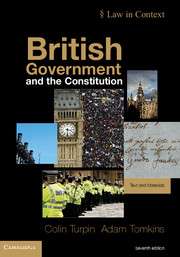11 - Liberty and the constitution
from Part IV - Liberty
Summary
This chapter examines the extent to which, and the ways in which, British constitutional law protects various aspects of personal liberty – of what may be called ‘civil liberties’. This is a very large topic, as well as being a critically important one, and we have had to be selective. In our selections we have tried to focus on issues that are both topical in early twenty-first-century Britain and representative of the overall field. We start with a survey of the relevant sources of law. In the next section we move on to examine the regime of Convention rights that was introduced into UK law by the Human Rights Act. In doing so we pay particular attention to the impact of Convention rights in areas touching upon matters of national security and counter-terrorism. This section may be read as a case study of the way in which the HRA has worked thus far. The chapter closes with two further case studies of the way in which liberty is protected in Britain. These case studies, concerning freedom of expression and freedom of assembly, consider both common law and statute and seek to place the HRA in the context of an analysis of the overall strengths and limitations of the constitutional protections of liberty in Britain. If one thing is clear, it is that, while the Human Rights Act is undoubtedly significant, it should not be the sole focus of our attention, even in this area of constitutional law.
Common law
The common law’s traditional approach to the protection of rights, exemplified in such leading cases as Entick v Carrington (1765) 19 St Tr 1029 (on which, see p 99), centres upon the notion of ‘residual liberty’. According to this approach we are free to do anything that is not legally prohibited. As Sir Robert Megarry V-C expressed it in Malone v Metropolitan Police Commissioner [1979] Ch 344, ‘everything is permitted except what is expressly forbidden’ (see above, p 101). Even liberty in its most basic sense of freedom from physical restraint is seen as having this residual character: the writ of habeas corpus, for protecting the individual from unlawful restriction of his or her liberty, may be unavailing if the restriction can be justified in terms of statutory provision such as Schedule 2, paragraph 16 to the Immigration Act 1971, section 2, 3 or 4 of the Mental Health Act 1983, section 41 of the Terrorism Act 2000 or section 4 or 5 of the Prevention of Terrorism Act 2005.
- Type
- Chapter
- Information
- British Government and the ConstitutionText and Materials, pp. 743 - 842Publisher: Cambridge University PressPrint publication year: 2011



